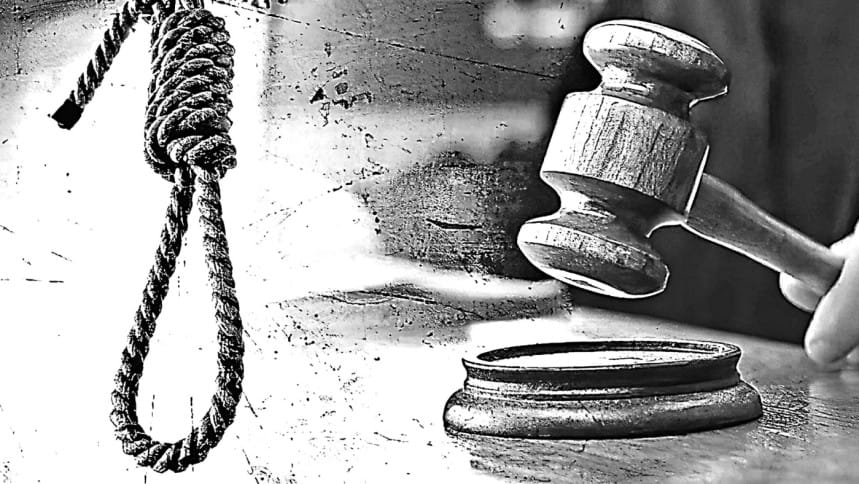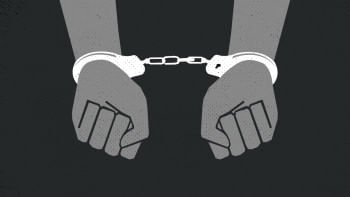Living under the agony of death

In our legal system, the death sentence is awarded to those who commit the most heinous crimes. When a decision of a death sentence by a trial court is sent to the High Court Division (HCD) for confirmation, it takes years before it is heard and disposed of. The HCD may or may not uphold such a death sentence and the decision of the HCD may be challenged in the Appellate Division of the Supreme Court which takes further time to conclude.
A prisoner on death row, as a last resort, may apply for the Presidential prerogative of mercy under Article 49 of the Constitution. Therefore, with the acceptance or rejection of the mercy petition from the President, a proceeding of a death sentence comes to finality. From the date of passing the death sentence till the conclusion of the appeal process in the Supreme Court, a death row convict, on average, has to stay in a condemned cell for around a decade. What is it like to wait to be executed!
In 2018, Obaid Ali died in a condemned cell after spending 13 long years as a death-row convict. He died on the day he was scheduled to be released after he was declared innocent by the apex court. He was alleged and convicted for killing two police constables in 2006. Thanks to the prolonged delay, he could not have the luck to enjoy the free air.
As of August 2021, a total of 782 death reference cases were pending before the High Court for hearing. The trials of these cases concluded six to sixteen years ago but the convicts remained in condemned cells during this time. There are also instances where prisoners languished in condemned cells for as long as 20 years waiting for their appeals to be heard by the High Court Division. The prisoners spend this delayed time with the torment of death in 10 feet by 6 feet sized cells.
Prisoners' rights are often overlooked in the criminal justice system of Bangladesh. Prolonged delay in execution of a death sentence has a dehumanising effect. It has a legal implication of depriving a person of his life in an unjust, unfair and unreasonable way to infringe fundamental rights guaranteed by the Constitution. It creates adverse physical conditions and psychological stress on the death row convicts. Studies have found that the delay in disposing of death reference cases leaves the condemned prisoners in trauma resulting in losing their mental stability, tendency to make them suicidal, etc. The torments of death row prisoners remain unspoken since most of them come from the most deprived part of the society as found by a study conducted by the University of Dhaka.
In the case of Re Medley (1890) the Supreme Court of United States considered four weeks between sentencing and execution to be a long delay and results in "horrible feelings" and "immense mental anxiety amounting to a great increase in the offender's punishment."
In the landmark case of Pratt and Morgan (1993), the Judicial Committee of the Privy Council ruled that executing prisoners after they had already spent more than five years on death row was "inhumane and degrading," amounting to unconstitutional double punishment. Such prisoners, the court held, must have their death sentences commuted to life in prison. This jurisprudence may have a great implication in our criminal justice system since our prisoners spend a long time waiting to be executed.
According to the statistics provided by the Department of Prisons of Bangladesh, 1,987 prisoners are languishing in condemned cells as of 19 September 2021. Immediately after the trial court verdict, convicts are placed in condemned cells according to section 30 of the Prisons Act, 1894. The Act states that a prisoner 'under sentence of death' shall be 'confined in a cell apart from all other prisoners and shall be placed by day and by night under the charge of a guard'. The phrase 'under sentence of death' is come under scrutiny since the prisoners are put into the condemned cell immediately after the trial court verdict and before there is finality regarding their fate by the apex court.
Similar prisons law operates in India. In Sunil Batra v Delhi Administration and Others (1978), the Indian Supreme Court held that Section 30 of the Prisons Act does not cover a prisoner on a death row so long as his petition for mercy to the President has not been disposed of. To be under sentence of death means to be under a finally executable death sentence. This view is confirmed by successive judgements.
The same court in Union of India v Dharam Pal (2019) held "The prisoner can be said to be under the sentence of death only when the sentence has become final, conclusive and indefeasible which cannot be annulled or voided by any judicial or constitutional procedure... Till then the person who is awarded capital punishment cannot be said to be a prisoner under sentence of death in the context of section 30, sub-section (2). This interpretative process would, we hope, to a great extent relieve the torment and torture implicit in sub-section (2) of section 30, reducing the period of such confinement to a short duration."
The inordinate delay in disposing of a death reference case to its finality indeed amounts to double punishment violating fundamental human rights guaranteed under our Constitution. In countries with better standards of human rights, the delay itself is being considered as a mitigating factor for commuting capital punishment. The sensitive process of taking one's life, be it lawful, must be dealt with utmost care. Any defect in that lawful process adversely affects the right to life and renders the whole process questionable. We must make sure that the letter of the law is not misconstrued, and the fundamental human rights of every single person are weighed justly against the literal interpretation of a statutory provision. Considering the sensitivity of death sentences, necessary steps must be taken to dispose of the cases rapidly to reach finality without undue delay.
The writer is head of chambers, law lab and an advocate, supreme court of bangladesh.

 For all latest news, follow The Daily Star's Google News channel.
For all latest news, follow The Daily Star's Google News channel. 



Comments